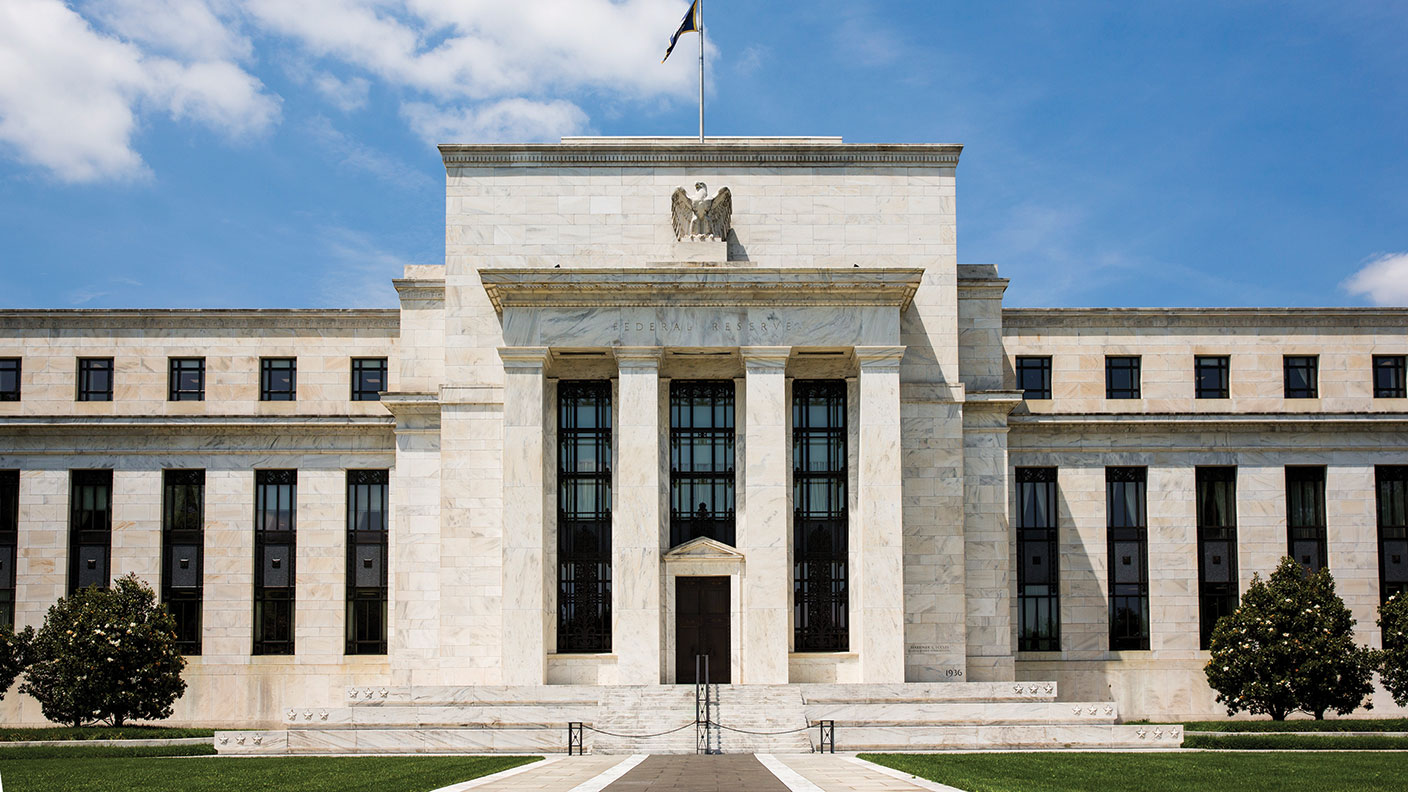How Omicron could trigger stagflation
As Omicron runs rife, populations are hunkering down, stifling consumption and growth. But with politicians and central banks reluctant to spend, that raises the threat of stagflation. John Stepek explains why.


Get the latest financial news, insights and expert analysis from our award-winning MoneyWeek team, to help you understand what really matters when it comes to your finances.
You are now subscribed
Your newsletter sign-up was successful
Want to add more newsletters?

Twice daily
MoneyWeek
Get the latest financial news, insights and expert analysis from our award-winning MoneyWeek team, to help you understand what really matters when it comes to your finances.

Four times a week
Look After My Bills
Sign up to our free money-saving newsletter, filled with the latest news and expert advice to help you find the best tips and deals for managing your bills. Start saving today!
So much for the Santa rally.
Looks like markets weren't as relieved by the Federal Reserve's monetary policy thoughts last week as we'd believed.
Or maybe – just maybe – it's something to do with this “will we, won't we” lockdown business.
MoneyWeek
Subscribe to MoneyWeek today and get your first six magazine issues absolutely FREE

Sign up to Money Morning
Don't miss the latest investment and personal finances news, market analysis, plus money-saving tips with our free twice-daily newsletter
Don't miss the latest investment and personal finances news, market analysis, plus money-saving tips with our free twice-daily newsletter
The Fed matters – but Covid matters too
There are two obvious factors behind the sudden return of fear to markets. The most obvious one – and the one that has been chipping away at confidence for most of this year, arguably – is the Federal Reserve's increasing appetite for slowing down its pace of monetary loosening.
It's entirely fair to scoff at the idea that the new policies from America’s central bank represent anything approaching “tight” monetary policy. Record-low interest rates combined with a balance sheet as big as the moon does not represent a miserly monetary policy.
However, what you also have to appreciate is that, for markets, it's the future that matters. So the direction of travel is key. And if we've gone from a bias to looser monetary policy to a bias towards less loose monetary policy, that's a tightening as far as the market is concerned.
So that's a big factor – and possibly even the fundamental factor at play here. The “sell the rumour, buy the news” relief rally that happened after the Fed meeting last week was just down to investors being overly negatively positioned before the meeting, but now they've also realised that tightening is still tightening and inflation is also still a worry.
However, while it makes sense to pin some of the blame on a slightly delayed reaction to the Fed, there's also another pretty obvious party pooper, and that's Omicron.
Despite vaccines, despite boosters, despite the fact that lots of us have had it (it swept our entire household in August), we're approaching Christmas 2021 with a feeling that's horribly like Christmas 2020.
Unlike almost every other journalist in the country, I'm not an epidemiologist (who knew there were so many highly-qualified people in journalism?) so I'm not going to even pretend to know if Omicron is less dangerous than all the other Greek alphabet varieties.
But if your world is anything like mine, then in the last week you've probably heard about more people coming down with Covid, and perhaps more importantly you know lots of people who've been cancelling nights out because they don't want to risk having to sacrifice a family Christmas dinner because they popped out for a pint with their work colleagues.
So two things seem to be true: Covid cases are up again, and fear of Covid is up again. And then on top of all that, there's the games that politicians are playing.
Omicron could end up being stagflationary
Politicians in many countries are trying very much to pretend that they're not re-imposing lockdowns because no one likes the politics of it, and the people who run the budgets aren't very happy about the idea of shelling out for more business compensation (I mean, if Britain reintroduces furlough payments now, then how is Rishi Sunak going to fund income tax decreases right ahead of his re-election campaign in 2024?)
That's why we've seen travel restrictions coming in more readily than official restrictions on going out and the like.
But with all this uncertainty, and with working from home pretty much back in place (for those who could already do it), the “velocity of people” as Helen Thomas of BlondeMoney memorably puts it, is diminishing again.
That in itself is a disinflationary or even deflationary force (although there are complications, as we'll get to in a moment). And the problem is that, unlike last time this happened, politicians no longer seem keen to spend more money (so no more fiscal stimulus) while central bankers are trying to look for the exit (so no more monetary stimulus).
If all the leisure sector companies who survived the past year to come out fitter and leaner and more appealing are shut down again, but this time don't have the support to keep their staff on or to compensate for loss of business, then you'll get “proper” unemployment.
No wonder markets are feeling the pain this morning. “Stay at home” stocks are all very well, but only if the people who are staying at home are continuing to get paid.
So what comes next? The main variable to watch is the evolution of the virus. If it turns out to be milder than expected (which seems to be the case in South Africa, but lord knows how population age and weather interact with all that) then maybe after Christmas everyone calms down a bit.
But some damage has already been done. If we tilt any further into lockdown – and of course, we'll now always have the spectre of new variants hanging over us – then the government will surely come under pressure to reinstate spending. But it's hard to see it being as generous as the last time.
What you then really need – to put it bluntly – is a big market crash. That would be enough to trigger a panic response from central bankers. But of course, one of the problems with lockdowns (minus substitute wages) is that, while they might be bad news for consumption and growth, they're also likely to exacerbate the supply chain problems that have been causing inflation in the first place.
So you'll still have rising costs, but you'll also have weak growth. Stagflation is a messy old business and something everyone will want to avoid. But unless Omicron turns out to be a flash in the pan – a lump of coal in all our Christmas stockings, but nothing more – then it's hard to see how we'll avoid it.
On that cheery note, I'll remind you that MoneyWeek magazine makes a brilliant gift for the investor in your life (which may well be you, of course, and there's nothing wrong with buying yourself a Christmas present, particularly when you get six issues free).
Get the latest financial news, insights and expert analysis from our award-winning MoneyWeek team, to help you understand what really matters when it comes to your finances.

-
 Should you buy an active ETF?
Should you buy an active ETF?ETFs are often mischaracterised as passive products, but they can be a convenient way to add active management to your portfolio
-
 Power up your pension before 5 April – easy ways to save before the tax year end
Power up your pension before 5 April – easy ways to save before the tax year endWith the end of the tax year looming, pension savers currently have a window to review and maximise what’s going into their retirement funds – we look at how
-
 How a dovish Federal Reserve could affect you
How a dovish Federal Reserve could affect youTrump’s pick for the US Federal Reserve is not so much of a yes-man as his rival, but interest rates will still come down quickly, says Cris Sholto Heaton
-
 New Federal Reserve chair Kevin Warsh has his work cut out
New Federal Reserve chair Kevin Warsh has his work cut outOpinion Kevin Warsh must make it clear that he, not Trump, is in charge at the Fed. If he doesn't, the US dollar and Treasury bills sell-off will start all over again
-
 'Investors should brace for Trump’s great inflation'
'Investors should brace for Trump’s great inflation'Opinion Donald Trump's actions against Federal Reserve chair Jerome Powell will likely stoke rising prices. Investors should prepare for the worst, says Matthew Lynn
-
 'Governments are launching an assault on the independence of central banks'
'Governments are launching an assault on the independence of central banks'Opinion Say goodbye to the era of central bank orthodoxy and hello to the new era of central bank dependency, says Jeremy McKeown
-
 Do we need central banks, or is it time to privatise money?
Do we need central banks, or is it time to privatise money?Analysis Free banking is one alternative to central banks, but would switching to a radical new system be worth the risk?
-
 Will turmoil in the Middle East trigger inflation?
Will turmoil in the Middle East trigger inflation?The risk of an escalating Middle East crisis continues to rise. Markets appear to be dismissing the prospect. Here's how investors can protect themselves.
-
 Federal Reserve cuts US interest rates for the first time in more than four years
Federal Reserve cuts US interest rates for the first time in more than four yearsPolicymakers at the US central bank also suggested rates would be cut further before the year is out
-
 The Bank of England can’t afford to hike interest rates again
The Bank of England can’t afford to hike interest rates againWith inflation falling, the cost of borrowing rising and the economy heading into an election year, the Bank of England can’t afford to increase interest rates again.